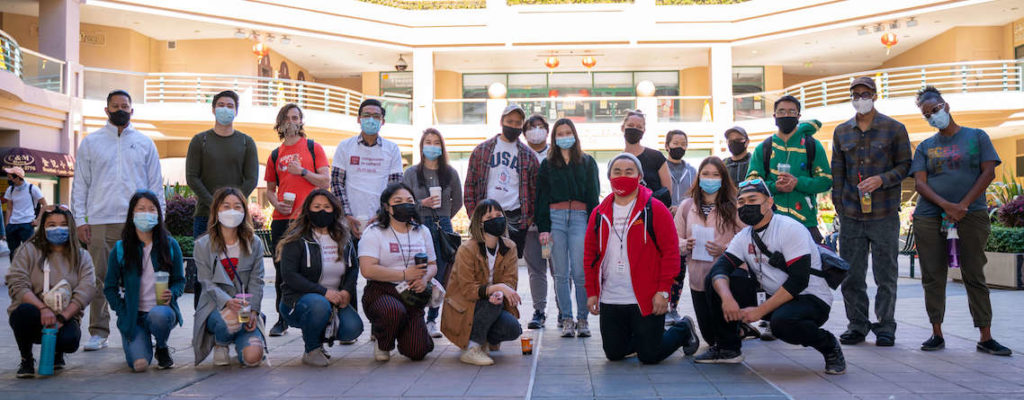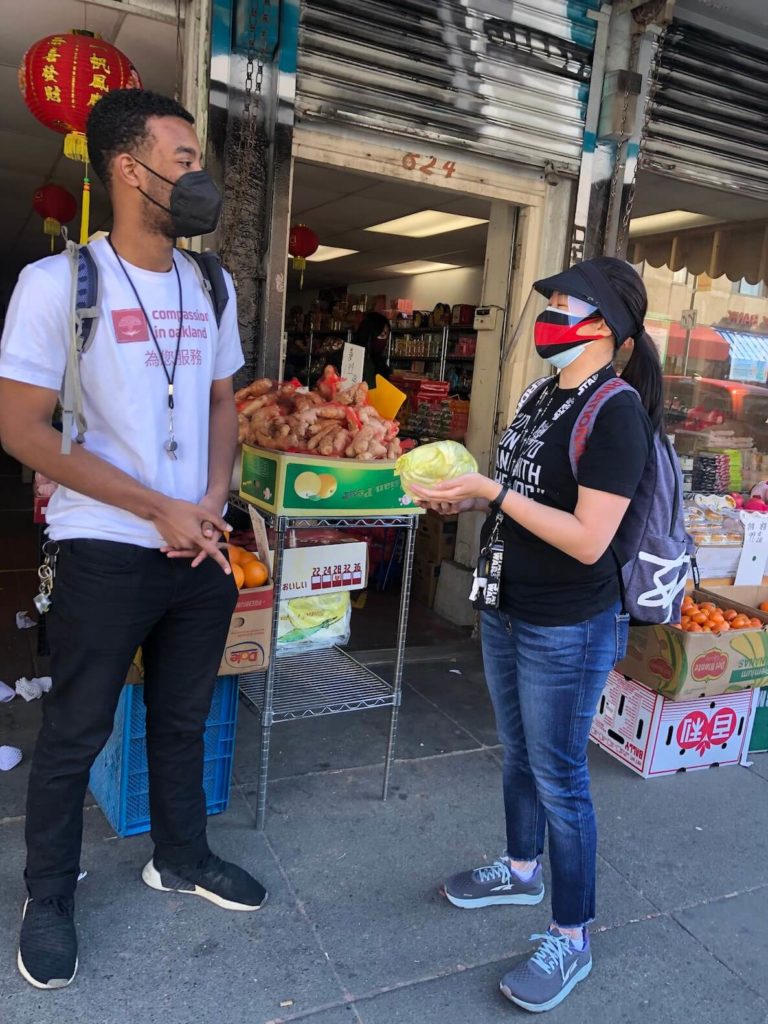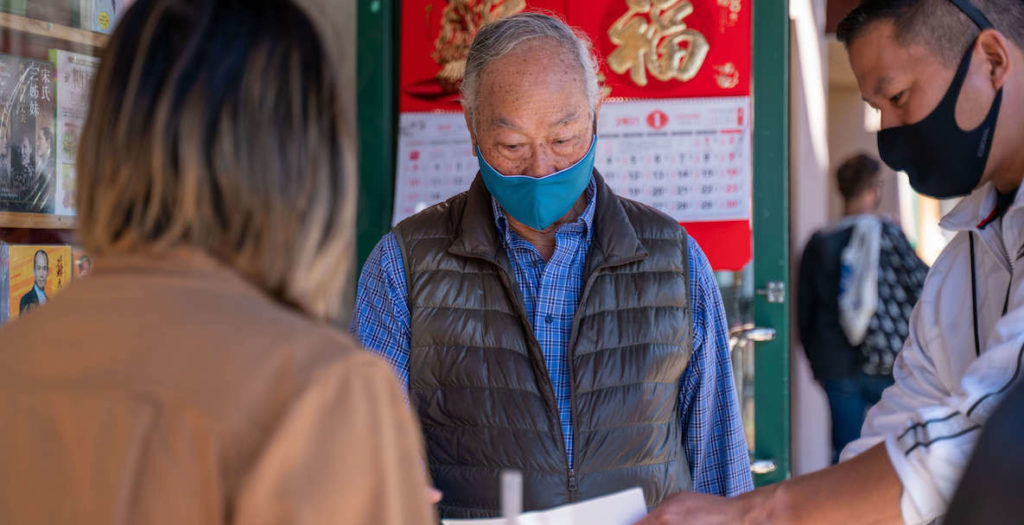Philly should look to this Oakland program to protect its AAPI community
Ideas We Should Steal: Protection for Asian Americans
In Philly, as in the country as a whole, anti-Asian hate crimes are on the ascent. An all-volunteer chaperone service in Oakland, California, is doing its part to protect the community
May. 12, 2021
The headlines are horrifying:
"Asian Family Fears Racial Targeting After Multiple Shots Fired at Their Metro Atlanta Home"
"Asian Seniors Find Their Cars Burned to a Crisp in Oakland"
"Witnesses Ignore Elderly Asian Adult female Punched and Kicked in Broad Daylight in NYC"
Just equally alarming as the nature of the incidents is their frequency: Since March nineteen, 2020, Stop AAPI Hate, a nonprofit detest crime tracker, received reports of more than vi,603 incidents against the Asian-American and Pacific Islander (AAPI) community. Hate crimes in major cities have increased by 150 percentage over the past yr.
Around the country activists have risen upward to have a stand up against racist rhetoric and violence. And ane grouping in Oakland, California, has taken a particularly unique approach to protecting the AAPI community: Pity in Oakland is an all-volunteer group that offers company or assistance to any Asian-American elders while they are out in public, both through a chaperone service that can be requested past telephone, and via weekend patrols.
More than ON SUPPORTING MINORITY COMMUNITIES IN PHILLY
-
- 17+ ways to support Asian Americans in Philadelphia and beyond
- Anti-Defamation League leaders call for unity—not hate—during this time of crisis
- This Dumplings Confronting Detest initiative could uplift Philly's Chinatown
- xix bang-up Black-owned businesses in Philadelphia that give back
The grouping came to be when Jacob Azevedeo, a 26-year-old Bay Surface area resident of Hispanic descent, watched media coverage of an 84-yr-former grandfather being shoved to his decease in Northern California, back in Feb. Balked, he put out a phone call on social media offering to chaperone anyone in Oakland'due south Chinatown neighborhood so that they would feel safer. Inspired by Azevedo's human activity of compassion, hundreds of others reached out to bring together him.

With momentum building, Azevedo was joined by four other Bay Area residents—Katrina Ramos, Jessica Owyoung, Derek Ko, and Darren Lee—to first organizing and mobilizing to found Compassion in Oakland.
"It's really go office of a bigger movement and information technology's been and so heartwarming having the back up from the community, especially during this time," says Ramos.
On the streets of Oakland
Now the v leaders, alongside about 570 rotating volunteers, spend every weekend on the streets of Oakland's Chinatown, following the CDC's Covid safety guidelines while looking out for and approaching any Asian-American elders who may be in demand of assist, whether information technology'southward with crossing the street or picking up groceries or getting to their bus terminate.
 Since mid-Feb, the grouping has responded to just over 100 in-the-moment and pre-scheduled chaperone requests, from residents of all ages. While they await official 501c3 status, they're currently operating as a nonprofit organisation with fiscal sponsorship, which allows them to take donations for costs like personal safety devices for the community, as well as advertisements in local Asian media and translation services—not to mention volunteers' T-shirts, masks, manus sanitizer, education and preparation materials, and more.
Since mid-Feb, the grouping has responded to just over 100 in-the-moment and pre-scheduled chaperone requests, from residents of all ages. While they await official 501c3 status, they're currently operating as a nonprofit organisation with fiscal sponsorship, which allows them to take donations for costs like personal safety devices for the community, as well as advertisements in local Asian media and translation services—not to mention volunteers' T-shirts, masks, manus sanitizer, education and preparation materials, and more.
They're likewise working on developing an app that would allow people to asking their services and streamline the expansion of their programs to other cities; they're now in San Gabriel Valley, outside of L.A., and will be launching in San Francisco within the next few weeks.
Co-founder Ramos says that in addition to physically chaperoning customs members, the grouping is spreading the word about their work and the upshot of surging AAPI attacks.
"From Friday to Sun nosotros are out in Chinatown walking around, doing customs outreach, reaching out to business owners and community members, actually creating that trust and brand awareness in the community then that people experience comfortable calling our phone number and requesting a chaperone to accompany them wherever they need to get," Ramos says.

"I chaperoned someone in her 20s who called u.s. the day after the Atlanta shooting. I think our presence and our mission statement is so clear that people who are feeling dangerous know they accept a place to become," says CIO volunteer leader Tiff Lin.
The founders recognize that it's not natural or easy for AAPI elders to rely on the help of strangers; with the increment in hate crimes, Ramos says, Asian elders are understandably hesitant to make themselves vulnerable to someone they don't know.
"When I think most my own grandmother, she's non going to stop and ask for help from strangers; she'd be similar thanks, I got this, and continue walking," says Lin. "But over time, what I observe as we go out every weekend is more caput nods, more than smiles, more I see you lot, thanks versus who are you?"
The City of Brotherly Love could use some compassion
Asian Americans brand up approximately seven percentage of Philadelphia's total population, and our city saw an appalling 200 percent increase in hate crimes against Asian Americans from 2022 to 2020; this doesn't factor in the incidents that likely went unreported.
Establishing a Compassion in Oakland-esque service for our Asian-American elders could take a meaningful affect in reducing that number and uniting the city with its Asian-American communities. The volunteer aspect of the service allows anyone to be able to give their support; and those who are chosen would too invariably become to connect more securely with Asian-American business owners while spreading the give-and-take about the service in Philly.
Other groups in Philly are responding to the needs of the Asian-American community in unlike ways. For case, as The Denizen previously reported, Asian Arts Initiative and Lok House are collaborating on "Motion picture Pals," a fashion to connect seniors with community members through art. There is the work of SEAMAAC, which supports Philly'south diverse array of ethnic groups with educational activity, healthcare, customs evolution, food, and Covid-19 support. At that place is also the work of groups similar Vietlead, which works with youth to accost bug the Southeast Asian communities here are facing; CAGP, which works to better the quality of lives of Cambodian-Americans in Philly through direct services and advocacy; and more.
Across the protection and networking, Compassion in Oakland is also working to fuel a mindset shift: Showing Asian-American elders that they aren't existence left to fend for themselves could assistance break down barriers between minority groups, paving the mode for solidarity and unity over partitioning.

"What's been amazing has been the reception from the Chinatown community," Ramos says. "People are really thankful that nosotros're there, people are open to speaking with the states and that'due south been actually great."
"When I become around seeing merchants and talking to them, they approach united states of america with respect, approach us with gratitude, some even offer free drinks," says Lin.
Don't forget the bigger picture show
Anti-Asian violence is rooted in America'due south history, from the Chinese Exclusion Acts of the 1880s that banned Asian immigrants from coming to the U.South. to the fabrication of the Model Minority Myth as a ways to create tension between minority groups and internalize oppression against each other, upholding white supremacy in the process.
And while organizations like Compassion in Oakland do much, maybe the but way to truly protect not only Asian Americans but as well other minority groups in America from violence is to unacquire the narratives passed down to us from past generations. Recognizing how nosotros inflict oppression onto others is step one; becoming more than deeply educated is a lifelong step two.
"The reality is that a lot of nonprofits be because the problems our communities are facing be," says Dương Nghệ Lý, co-founder of the grassroots nonprofit Vietlead, which is based in Philadelphia and Camden. Echoing a common refrain among nonprofit leaders, he says, "We take to make it so that we are not needed anymore. If we keep existing, information technology but means that problems are still there, and things volition not modify in the long run."
The piece of work of groups like Compassion in Oakland can't be the only means of tackling a generational effect.
"It takes a lot to change people'southward mentality or agreement of what's going on, but I call up we need to recollect beyond individual approaches and solutions and look more at how can we push back confronting structural violence that has been plaguing not merely the Asian community but also other communities, [like] Blackness, Indigenous, and other communities of colour." says Lý.
"It just takes one, two, three people to outset a movement. If you lot see something incorrect, practise something virtually it or discover support and help them through it," says Lin. "Say that you're not alone in this, that nosotros're not alone in this. The more movements that are based on genuine care and support for the people, the more we tin can come across a brighter hereafter for our planet, to be in the right relationship with community, with the state, and with each other."
The Citizen is one of 20 news organizations producing Bankrupt in Philly, a collaborative reporting project on solutions to poverty and the city's push towards economic justice. Follow the project on Twitter @BrokeInPhilly .
William Keo is a 17-year-old junior at Academy at Palumbo. He is one of four countdown fellows of Denizen Teen, a journalism mentorship plan funded by the Solutions Journalism Network to amplify the voices of youth from the School District of Philadelphia.
Header photo by Kasey Nghia Pham 



Source: https://thephiladelphiacitizen.org/compassion-oakland-aapi/
0 Response to "Philly should look to this Oakland program to protect its AAPI community"
Post a Comment